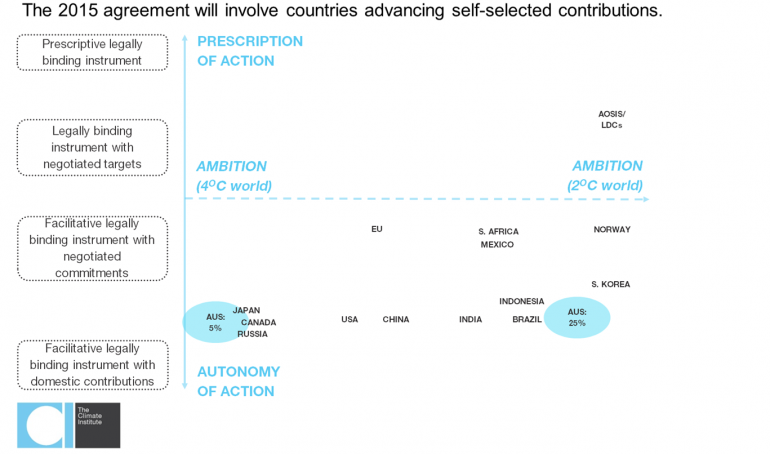Why Edis is wrong on climate diplomacy
Climate diplomacy is the erratic celebrity of the climate change debate. The signing of the Climate Convention (UNFCCC) in 1992 at the Rio Earth Summit, the Kyoto Protocol agreement five years later and the now infamous fall from grace of the Copenhagen talks in 2009 were all rock star moments.
As with any celebrity, however, there is a gap between perceptions and reality. This is illustrated by Tristan Edis’ recent commentary ‘Drinking the green Kool-Aid at a Warsaw intermission’ (November 25).
Let me deal with an error in the article first. Depending on the shape of the agreement itself and any domestic policies that the US has in place, then the United States can join international agreements without a two thirds majority Senate vote. That is not to say this will happen but it's incorrect to say it can’t happen.
Let me also say up front that I am in furious agreement with Tristan on two points.
Firstly, international agreements do not reduce emissions by themselves. Domestic policies are the foundation of global action and investments in low carbon technology. We have seen the extent and breadth of domestic action grow significantly in the last five years, in part because of the international attention Copenhagen generated and also because countries are increasingly appreciating that climate action is in their own economic and security national interests.
The proportion of the global population covered by national climate policies has grown from around a third before Copenhagen to around 75 per cent today. This year, the US and China, in particular, have implemented significant policies to reduce emissions at home and internationally, (for example, carbon pricing, emission standards, withdrawing funding from new coal build by development banks).
Secondly, I also agree that unless we develop a more sophisticated understanding of the role of climate diplomacy, interest groups that seek to delay effective policy implementation in Australia will have a field day. This is in part why the article, I thought, was disappointing.
More broadly, the crux of the article and its failure to address the likely outcomes from climate diplomacy are built on two misunderstandings of what nations are seeking to do on the road to the Paris meeting in 2015. This is the year they are seeking to agree on a new binding instrument covering emission reductions from all major emitters.
The first misconception is that countries are seeking to negotiate a 1980s-1990s Kyoto Protocol or Montreal Protocol type of agreement. They're not.
The figure below illustrates this point. On the vertical axis, the legal form of the new agreement is mapped. At the top we have an agreement where the legally binding contribution a country makes is determined by internationally agreed rules. At the bottom, you have a binding agreement which captures the self-selected domestically binding commitments countries are undertaking.
The positions of the major nations against in this matrix are shown against this axis. It is clear that the weight of national positions is towards a more 'bottom up' type of agreement (at the moment). If you want participation in the agreement by all major emitters this is where the Paris outcome is likely to be resolved.
Note the figure also maps the domestic actions that countries are taking against an assessment of a fair contribution to avoiding dangerous climate change. Currently, only a few nations are advancing 2020 commitments consistent with their fair contribution to avoiding a 2 degree increase in global temperature. (Australia’s 5 and 25 per cent emission targets are illustrated and, as we have argued elsewhere, the only way Australia’s national interest in avoiding a 2 degrees increase in global temperatures is if we and others advance contributions consistent with this outcome.
Note: AOSIS stands for Alliance of Small Island States and LDC stands for Least Developed Countries.
The other misconception that permeates the debate is that Paris will be a big bang event that saves the climate. It will not. While Paris is an important moment, climate diplomacy is going to continue for decades and at a step at time. Each major milestone will set new norms of international behaviour that through time will evolve and influence domestic policy making.
To illustrate, Kyoto normalised that developed nations would have quantified absolute emission reduction goals and the role in international markets in meeting these obligations. These markets helped stimulate the global investment boom in renewable energy and helped China and others build confidence in carbon pricing mechanisms.
Copenhagen actually didn’t fail as some suggest but set the scope broader than this by facilitating emission reduction contributions from all major emitters and defining the political contours of the Cancun through to Durban agreements. Its high profile engagement with world leaders also sparked and accelerated domestic policy making ranging from carbon pricing in China, South Africa, South Korea and Mexico through to emission standards in the US and Canada.
Paris, if successful, will see an agreement whereby all major emitters must submit emissions reduction contributions to the international community; these contributions would cover the period between 2020 and 2030 and be subject to robust transparency arrangements and review.
(The expectation is now on Australia to advance its new post 2020 contribution by April 2015 at the latest and the final Climate Change Authority report in February 2014 will be a key benchmark against which this contribution is defined.)
The next major milestone, wherever and whenever it is, could see these contributions move from being domestically binding to internationally binding. Through time the agreement could evolve to include robust international compliance mechanisms, as major countries seek to ensure others are not free riding on their actions.
Establishing a rule-based framework that ensures transparency, trust and credibility in country's actions can help achieve deep and lasting emission reductions. This can be secured through diplomacy that engages and builds multilateral institutions while facilitating additional domestic policies.
Tristan is right that unless we fully appreciate the strengths and weaknesses of international agreements then we risk letting our governments and emissions-intensive industries off the hook.
If we keep looking for rock stars we will be disappointed. The reality is we need a strong rhythm section in global climate action – and that is the role of international agreements. Whether Australia can provide a good bass guitar remains to be seen.
Erwin Jackson is deputy chief executive of The Climate Institute.
















